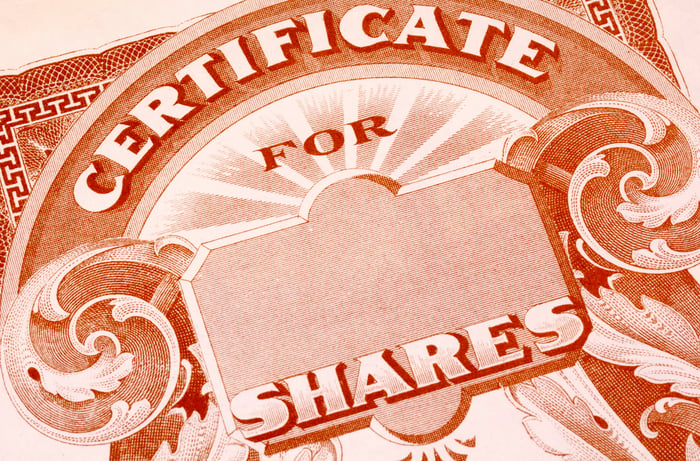This has been an unforgettable year for Wall Street and investors, with the benchmark S&P 500 breaking records to the downside and upside all within a six-month period.
In the first quarter, equities suffered their quickest and steepest bear market decline in history, with the broad-based S&P 500 losing 34% in 33 calendar days. This was then followed by a ferocious rally that saw the index catapult to new a fresh all-time high less than five months after reaching the March 23 bottom.

Image source: Getty Images.
Stock split euphoria has hit Wall Street
While the performance of small-, mid-, and even some large-cap equities have been completely hit-and-miss in 2020, investors of innovative megacap companies like Apple (AAPL 1.27%) and Tesla (TSLA 12.06%) have made bank. Through Wednesday, Aug. 27, shares of Apple were up about 70% year-to-date, with electric-vehicle (EV) manufacturer Tesla higher by an even more impressive 435%.
But what's staggering about these two companies isn't that they're outperforming. Both Apple and Tesla have been leaders in their respective industries for a long time. Rather, it's that a good chunk of their year-to-date gains have occurred since their respective announcements that they would be enacting a stock split.
A stock split allows a publicly traded company to alter its share price and outstanding share count without changing its market value. In Apple's case, it'll be enacting a 4-for-1 stock split. This means that for each share of Apple stock an investor currently owns, they'll own four times that amount when the split takes effect on Aug. 31. Conversely, Apple's share price will fall to a quarter of what it is now. Whether you own 10 shares at $500 or 40 shares at $125 (this would be a 4-for-1 split), the value of your holdings, and Apple's market cap, would remain the same.
Tesla, meanwhile, is enacting a 5-for-1 stock split. For each share of Tesla a person owns, they'll soon have five shares. But at the time same time, Tesla's share price will be reduced to a fifth of what it is now, with the split-adjusted price also taking effect today, Aug. 31. Once again, no value has been created by splitting the stock.
Yet, since their respective stock split announcements, Apple's share price has surged by 30%, with Tesla's stock up 63%. In market value, we're talking about Apple tacking on $493 billion, and Tesla's market cap surging by $161 billion.

Image source: Getty Images.
Why are investors buying into this stock split hype?
You might be wondering what, exactly, are the reasons behind this rapid surge in market cap for Apple and Tesla following their respective stock split announcements on July 30 and August 11.
One possible answer is the excitement surrounding accessibility. Although a number of brokerages now allow their customers to purchase fractional shares of stock, not all brokerages allow for fractional-share purchases. With Apple and Tesla at $500 and $2,239 a share, respectively, this means an investor with $400 in spare cash couldn't buy into Apple, nor could someone with an extra $2,000 buy a single share of Tesla. With these respective splits enacted today (Aug. 31), Apple's share price will drop to around $125 a share, with Tesla falling to roughly $448 a share, based on Aug. 27 closing prices. This makes it a lot easier for customers whose brokerages don't allow for fractional share purchases to buy into one or both companies.
It could also be argued that the psychology behind a stock split is sending Apple and Tesla markedly higher. After all, a company wouldn't be enacting a split if its share price hadn't dramatically increased in value. A stock split where a company's share price is reduced to make it more "affordable" to investors, at least on a per-share basis, suggests that the company enacting the split is doing quite well (i.e., growing sales and/or profits).
It probably also doesn't hurt that both companies are industry leaders and brand names in most households. It's no secret that investors like to buy into companies they're familiar with, and there's little question that Apple and Tesla have some of the most loyal customers in the world.

Image source: Getty Images.
Stock split euphoria has made Apple and Tesla unworthy of new investment dollars
If you're a longtime shareholder of Apple and/or Tesla, the past couple of weeks have probably been a lot of fun. But if you're on the outside looking in and considering buying into either of these names, I believe this stock split hype has officially made both companies unworthy of your investment dollars.
With regard to Apple, the company was already becoming richly valued prior to announcing its stock split. Today, it's valued at more than 38 times Wall Street's projected earnings per share for 2021.
Some folks would point out Apple's ongoing transition away from being just a products company to one that offers higher-margin services. Services offer less lumpy revenue recognition and have been growing at a steady double-digit rate for a while. But the thing is, Apple only generated 22% of its sales in the most recent quarter from services. It's fine to value a pure-play services company that's reinvesting most of its operating cash flow at close to 40 times earnings, but it makes little sense to do so with a mature business model like Apple. After being valued at between 10 and 20 times its forward earnings for more than a decade, its current forward multiple makes the stock highly avoidable.
The same could be said for Tesla, which has yet to generate a full-year profit on the basis of generally accepted accounting principles (GAAP), but sports a market cap north of $400 billion.
While there's no denying that Tesla had first-mover advantages in the EV space, or that's its hit the point of successful mass production, it's not as if Tesla will be able to hang onto these advantages moving forward. Ford and General Motors are making huge investments in EVs, and outsiders like NIO have eyes on the U.S. market. The auto industry is a capital-intensive, low-margin battleground where sustainable competitive advantages rarely persist. That makes Tesla's astronomically priced stock unworthy of your hard-earned money at its current valuation.





